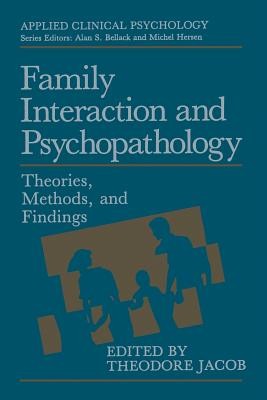
- We will send in 10–14 business days.
- Author: Theodore Jacob
- Publisher: Springer
- Year: 2013
- Pages: 662
- ISBN-10: 1489908420
- ISBN-13: 9781489908421
- Format: 15.6 x 23.4 x 3.5 cm, softcover
- Language: English
- SAVE -10% with code: EXTRA
Reviews
Description
Throughout the past 30 years, there have been significant developments in theory and research relating family variables to various psychopathologies. The potential importance of such efforts is obviously great, given the implications that reliable and valid findings would hold for treatment and preventive inter- ventions across a variety of settings and populations. The purpose of this volume is to present a critical evaluation of this field of inquiry through a detailed assessment of the theoretical perspectives, the methodological issues, and the substantive findings that have characterized family studies of psychopathology during the past several decades. The book is divided into four parts, each con- taining contributions from leading researchers and theorists in the field. The first part, Background, presents a review of the major streams of influence that have shaped the development and the present character of the field. The second part, Conceptual Foundations, contains presentations of gen- eral models and orientations relevant to family studies of psychopathology. In most cases, a particular theoretical perspective provides the primary underpin- ning of the approach, the exception to this format being the family model of David Reiss based on the concept of the family paradigm. The major objective of this part is to present a broad yet detailed set of chapters that address the conceptual status of the field. It is hoped that this material will provide a rich background against which subsequent discussions of specific theories, methods, and findings can be more fully appreciated.
EXTRA 10 % discount with code: EXTRA
The promotion ends in 10d.17:08:40
The discount code is valid when purchasing from 10 €. Discounts do not stack.
- Author: Theodore Jacob
- Publisher: Springer
- Year: 2013
- Pages: 662
- ISBN-10: 1489908420
- ISBN-13: 9781489908421
- Format: 15.6 x 23.4 x 3.5 cm, softcover
- Language: English English
Throughout the past 30 years, there have been significant developments in theory and research relating family variables to various psychopathologies. The potential importance of such efforts is obviously great, given the implications that reliable and valid findings would hold for treatment and preventive inter- ventions across a variety of settings and populations. The purpose of this volume is to present a critical evaluation of this field of inquiry through a detailed assessment of the theoretical perspectives, the methodological issues, and the substantive findings that have characterized family studies of psychopathology during the past several decades. The book is divided into four parts, each con- taining contributions from leading researchers and theorists in the field. The first part, Background, presents a review of the major streams of influence that have shaped the development and the present character of the field. The second part, Conceptual Foundations, contains presentations of gen- eral models and orientations relevant to family studies of psychopathology. In most cases, a particular theoretical perspective provides the primary underpin- ning of the approach, the exception to this format being the family model of David Reiss based on the concept of the family paradigm. The major objective of this part is to present a broad yet detailed set of chapters that address the conceptual status of the field. It is hoped that this material will provide a rich background against which subsequent discussions of specific theories, methods, and findings can be more fully appreciated.


Reviews